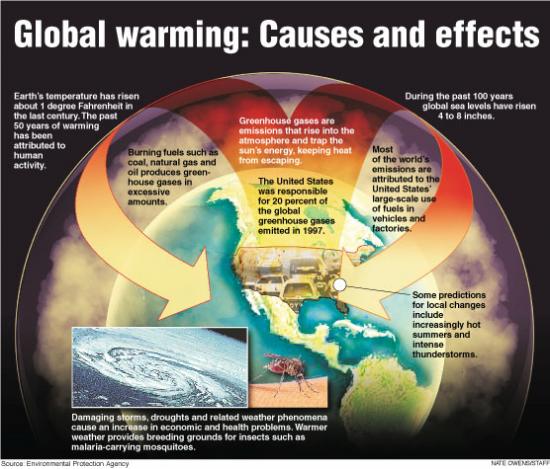Global warming is perhaps the most important environmental problem in the world today. Many organizations, big celebrities are giving their valuable time for the awareness of the cause and bad effects of global warming, among the people. But what exactly the Global warming is? – Earth is steadily warming up because of human activities. Levels of greenhouse gases are increasing in the atmosphere due to human activities, and are changing the composition of the atmosphere and global warming. Gases, primarily carbon-dioxide, emitted while burning fossil fuels like coal, gas and oil, lead to heat being trapped by the atmosphere. That heat causes glaciers to melt, floods, droughts, extinction species… It’s a long scary list like…
• Growing incidence of droughts in some areas, floods in others;
• The rising temperatures of oceans and the sea level;
• Increase extreme weather events such as tornadoes and hurricanes;
• The melting of mountain glaciers and the reduction of snow cover;
• Dying coral reefs, and
• Coastal erosion, and loss of coastal ecosystems.

Effects of global warming: The effects of global warming, perhaps heating up a degree less than the global average. As the world’s oceans are fed by melting glaciers and ice caps, sea levels will rise by as much as 3 feet( 1 meter) within the next 100 years. As temperatures rise, the oceans will evaporate more quickly, creating more clouds and more rainfall. There will be more heat waves, droughts, floods, glaciers melting very rapidly, leading to serious water stresses in several parts. So global warming is visible, measurable and if we won’t take it seriously, it will really get worse. However it is affecting the entire world, if we just look upon the affects of global warming in India- our low lying coastal areas could get submerged. Sea level rise is a threat to the Sunderbans. The kind of events like the record rainfall you saw in Mumbai in july 2005, will happen frequently, with much more intensity. Our glaciers are melting; the flow in our river systems in atleast the northern parts will be affected.
Sometimes the question arises like “Earth has had drastic climate changes before. So how can we be sure that global warming is man made this time?”- The answer is in the evidence that atmospheric carbon-dioxide used to be 280 parts per million [ppm] before industrialization, it’s now over 380 ppm. There is more or less a perfect fit between our scientific models that predicted temperature changes and actual observations. If you look at projections for the future, even if we were to stabilize the concentration of atmospheric gases today, climate change will continue for several decades. So we will have to adapt to it’s impact anyway.
The way to reduce global warming: According to R.K. Pachauri, chairman of IPCC( Inter governmental panel on climate change), some measures to be taken against climate change like we have to bring about a transition in our development. If talking about transportations, it is not done that one person drives 100 kilometres everyday to get to work. We need better public transport. According to him, “It is theoretically possible to reverse global warming. You will have to really bring down your emissions to below zero and find ways by which you can absorb existing carbon-dioxide. But it requires political will. It’s so essential to create awareness among the public, because at least in the democracies of the world, people will put pressures on leaders to do what is expected of them.”
Tips for ordinary citizens to help in reducing global warming:
• Modify an old incandescent bulb style. Buy a more efficient compact fluorescent bulb (CFL).
• Inflate your tyres. Keep your car tyres properly inflated.
• Change your air filter. Check your car’s air filter often.
• Reduce garbage. Buy products with less packaging and recycle paper, plastic and glass.
• Carpool when you can. Carpooling with friends and colleagues saves fuel.
• Unplug the toaster and cell phone chargers and others when they are not in use.
• Turn off your light when you leave the room for more than a minute.
• Choose the wash in cold water.
• 132 gallons of water are needed to produce one pound of potatoes. Beef 26400 gallons. Agriculture is the main source of carbon dioxide emissions after the energy sector. Eat more grains and fruits and vegetables.
The reality is that we, as a human race, have expanded our footprints on the earth’s ecosystems to a point where it’s hurting us, it’s hurting all forms of life, and it’s certainly something that our children and grandchildren will curse us for.




